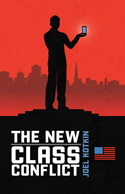By Telos Press · Tuesday, October 25, 2016 Writing in the journal Contemporary European History, Mia Lee reviews a group of recent books that focus on the historical connections between Nazism, the Muslim Brotherhood, and the rise of al-Qaeda. Included in the review is Matthias Küntzel’s Jihad and Jew-Hatred: Islamism, Nazism and the Roots of 9/11, published by Telos Press. Purchase your copy in our online store, and save 20% by using the coupon code BOOKS20. An excerpt from the review:
Küntzel begins his narrative with the founding of the Muslim Brotherhood in 1928, which became the largest mass organisation in Egypt in the 1930s. During the war the Brotherhood was stridently anti-British, anti-foreigner and increasingly anti-Jewish. Its leader, Hassan al-Banna, had ties to al-Husaini. Once the war was over al-Banna was one of the most prominent Arab leaders to petition the Allied authorities for al-Husaini’s release from detention, and when the Mufti escaped from France in 1947 al-Banna personally welcomed him in Cairo. On the evidence of these ties, as well as his study of the Brotherhood’s ideology, Küntzel argues that the Brotherhood was the key point of transference of anti-Semitism from National Socialism to the Arab world. . . .
Continue reading →
By Telos Press · Tuesday, May 31, 2016 Writing at the Jerusalem Center for Public Affairs website, Joseph S. Spoerl reviews Matthias Küntzel’s Germany and Iran: From the Aryan Axis to the Nuclear Threshold, published by Telos Press Publishing. “Küntzel’s book,” writes Spoerl, “demonstrates a deeply disturbing truth, namely, that if Iran should acquire nuclear weapons and use them to commit a second Holocaust against the six million Jews of Israel, then Germany—the nation that committed the first Holocaust—will have played a central role in paving the way for the Iranian perpetrators.”
Save 20% on your purchase of Germany and Iran, as well as other Telos Press books, by using the coupon code BOOKS20 in our online store.
Continue reading →
By Arno Tausch · Monday, April 4, 2016 In his account of the impact of Islam on Europe, Michael Ley pulls no punches, especially for all those readers, like the present reviewer, who still hope that a Muslim humanism and not Islamist terrorism will become the primary social movement in global Islam in the years to come. In a nutshell, Ley’s main theses are the following: Orthodox and radical Islam are the scourge of humanity. Ley calls Sharia Islam “the worst danger for democracy and human rights in the 21st Century.” Only an Islam without Sharia is compatible with human rights. Yet that is a vision for the future; current reality, according to Ley, is different. The Islamization of Europe is, according to Ley, the most visible change in most European societies. While liberal and educated citizens consider the increasing influence of conservative and radical Islam with great concern and regard the future of the continent as rather bleak, their so-called progressive opponents interpret the ongoing Islamization as a cultural enrichment that contributes to the historical overcoming of the obsolete nation-state. Ley goes as far as to say that today the pioneers of radical post-national Europe would prefer to abolish all symbols of national identity: indigenous Europeans should waive all national, cultural, religious, and ultimately also traditional sexual identities.
Continue reading →
By Telos Press · Friday, October 2, 2015 At the Great War Fiction blog, George Simmers reviews Ernst Jünger’s Sturm, now available from Telos Press. You can purchase your copy in our online store, and save 20% with the coupon code BOOKS20.
Continue reading →
By Telos Press · Tuesday, August 11, 2015 Writing in the new issue of the Israel Journal of Foreign Affairs, Soli Shahvar reviews Matthias Küntzel’s Germany and Iran: From the Aryan Axis to the Nuclear Threshold, published by Telos Press. Read the full review here (subscription required). You can purchase your copy of Germany and Iran in our online store.
Continue reading →
By Telos Press · Wednesday, May 6, 2015 In a recent issue of First Things, Naomi Schaefer Riley reviewed Joel Kotkin’s The New Class Conflict:
 Ever since the 2000 election, we have talked about an America divided between red and blue. But in his new book, Joel Kotkin argues that we are experiencing more than a geographical divide. For the first time since its founding, he suggests, America is experiencing a potentially devastating class conflict—the kind of division between the elites and the rest of America that could all but break the country’s middle-class backbone. Ever since the 2000 election, we have talked about an America divided between red and blue. But in his new book, Joel Kotkin argues that we are experiencing more than a geographical divide. For the first time since its founding, he suggests, America is experiencing a potentially devastating class conflict—the kind of division between the elites and the rest of America that could all but break the country’s middle-class backbone.
It is striking that Kotkin, a regular contributor to the Wall Street Journal‘s editorial pages, is making this claim. For years, the left has argued that class warfare is a fact of life in America, even encouraging class resentment to achieve its political aims.
Continue reading →
|
|



